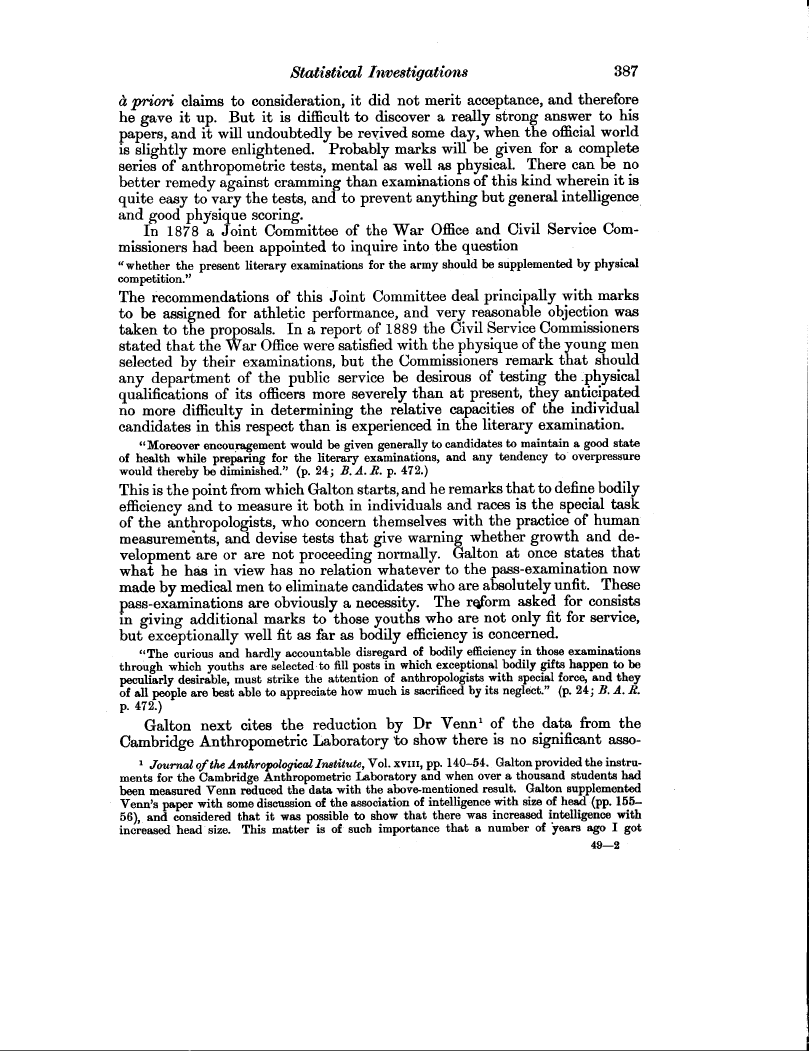Statistical Investigations 387
a priori claims to consideration, it did not merit acceptance, and therefore he gave it up. But it is difficult to discover a really strong answer to his papers, and it will undoubtedly be revived some day, when the official world is slightly more enlightened. Probably marks will be given for a complete series of anthropometric tests, mental as well as physical. There can be no better remedy against cramming than examinations of this kind wherein it is quite easy to vary the tests, and to prevent anything but general intelligence and good physique scoring.
In 1878 a Joint Committee of the War Office and Civil Service Commissioners had been appointed to inquire into the question
"whether the present literary examinations for the army should be supplemented by physical competition."
The recommendations of this Joint Committee deal principally with marks to be assigned for athletic performance, and very reasonable objection was taken to the proposals. In a report of 1889 the Civil Service Commissioners stated that the War Office were satisfied with the physique of the young men selected by their examinations, but the Commissioners remark that should any department of the public service be desirous of testing the :physical qualifications of its officers more severely than at present, they anticipated no more difficulty in determining the relative capacities of the individual candidates in this respect than is experienced in the literary examination.
"Moreover encouragement would be given generally to candidates to maintain a good state of health while preparing for the literary examinations, and any tendency to overpressure would thereby be diminished." (p. 24; B. A. R. p. 472.)
This is the point from which Galton starts, and he remarks that to define bodily efficiency and to measure it both in individuals and races is the special task of the anthropologists, who concern themselves with the practice of human measurements, and devise tests that give warning whether growth and development are or are not proceeding normally. Galton at once states that what he has in view has no relation whatever to the pass-examination now made by medical men to eliminate candidates who are absolutely unfit. These pass-examinations are obviously a necessity. The retform asked for consists in giving additional marks to those youths who are not only fit for service, but exceptionally well fit as far as bodily efficiency is concerned.
"The curious and hardly accountable disregard of bodily efficiency in those examinations through which youths are selected to fill posts in which exceptional bodily gifts happen to be peculiarly desirable, must strike the attention of anthropologists with special force, and they
of all people are best able to appreciate how much is sacrificed by its neglect." (p. 24; B. A. R. p. 472.)
Galton next cites the reduction by Dr Venn' of the data from the Cambridge Anthropometric Laboratory to show there is no significant asso
' Journal of the Anthropological Institute, Vol. xvIII, pp. 140-54. Galton provided the instruments for the Cambridge Anthropometric Laboratory and when over a thousand students had been measured Venn reduced the data with the above-mentioned result. Galton supplemented
Venn's paper with some discussion of the association of intelligence with size of head (pp. 15556), and considered that it was possible to show that there was increased intelligence with increased head size. This matter is of such importance that a number of 'years ago I got
49-2

